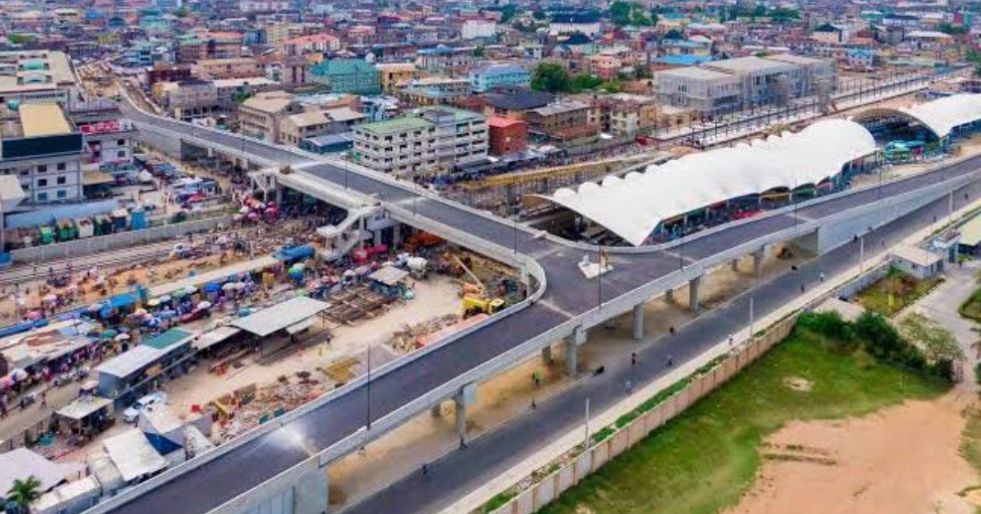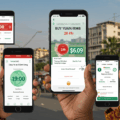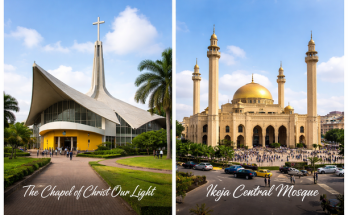By Sunkanmi Adewunmi
Edited by Ezennia Uche
Lagos life is always in motion, and Ikeja’s bus stops – like this one under the expressway – are microcosms of the city’s energy. In a metropolis of ~24 million people, the rhythm is unpredictable: traffic jams freeze, then roar to life without warning, and street markets hum with vendors and preachers at all hours. As one Smithsonian observer noted of Lagos’s Balogun market, shoppers “navigate through the masses…vendors yelling…chaotic? Yes. But when merged together…[it is] nearly rhythmic”. In Lagos culture, chaos itself is part of the music. (After all, Lagos was called a “Wild West” of entrepreneurship by one local.) Ikeja, the capital of Lagos State, inherits this vibe wholeheartedly. Its streets are so busy that even the biggest malls and bus terminals feel like open-air theatres of hustle and bustle.
The Chaos of Ikeja: Bus Parks, Markets, and More
By dawn, Ikeja’s bus parks already look like “impromptu parties in suspense.” Commuters clutch their bags like life jackets under overpasses and on dusty junctions, all waiting for the first yellow danfo or shuttle. But patience has an expiry: “as soon as a bus screeches in, the crowd suddenly goes from calm to frenetic”. Lagosian wits say it best: “every commuter at a Lagos bus stop is a normal person…until the bus arrives.” At that moment, orderly queues devolve into a merry (if chaotic) scrum.
The cast at an Ikeja bus stop is colorful. Conductors lean out of moving buses, chanting destinations in a singsong chorus; hawkers weave between vehicles selling everything imaginable – “Yam, plantain, cucumber!” and sachets of water or phone chargers. In fact, one Guardian journalist describes Lagos’s busiest hubs (like Iyana-Ipaja, just outside Ikeja) as scenes of constant commotion, where gridlock becomes an ideal marketplace for street hawkers. Mama Cooks sells puff-puff from a makeshift cart, another hawker slings chilled drinks, and even itinerant pastors set up shop with megaphones – Lagos’s unlicensed open-air events. Every so often, all it takes is a dropped soft drink or a spilled bowl of soup to turn a dozen bystanders into impromptu sprinters, each eager not to be the slowpoke left standing.
Traffic jams are even turned into business as usual here. Some Lagosians have built livelihoods out of gridlock: one street vendor sells cold soda to trapped commuters day after day. Congestion is so familiar that in Ikeja even a jam-packed expressway is described as “a means of survival” for traders. The chaos is part of the show – or Lagosian life – and many choose humor to cope. Even a father yelling “Abeg, I no get small change o!” at a conductor becomes part of the morning comedy.
When One Person Runs, Everyone Follows
It goes like this in Lagos: one commuter hears a strange noise (or thinks they do), bolts upright, and before you know it, the whole crowd is sprinting down the street. No announcements needed. No questions asked. This herd response is woven into Lagos street life. Psychologists even have a name for it: herd mentality, a phenomenon where people unconsciously mimic the actions of a group. In Ikeja’s long history, there have been true alarms, even tragedies, training folks to heed that first guy who takes off. For example, after the 2002 military depot explosion in Ikeja, Nigerians recalled how “thousands streamed onto the streets not knowing which way to run”. (For Lagosians of a certain age, that memory is indelible.) So the unofficial rule became: If you see one person doing a dash, just join the dash.
Lagosian Instincts and Past Traumas
What does this say about Lagosians? Part of it is simple survival instinct. Lagos life can turn dangerous without warning. We’ve seen real reasons to flee: that old Ikeja armory explosion was no joke, and even journalists noted it left people in “general panic”, scrambling for safety. When even children heard the blasts, many ran reflexively – a lesson now etched into city DNA. So the unofficial wisdom goes, “Better to run first and ask later.”
It’s also about psychology. As noted, herd mentality drives the crowd. When one neighbor dashes, Lagosians trust that something serious must be up. (No one wants to be the only one standing still if it turns out to be a fire or an armed robbery.) Another Lagosian trait is humor and hustle: life is chaotic, so why not joke about it? Even amid the scramble, there’s camaraderie. As one local writer observed, “beyond the chaos, there is a real human bond” in Lagos. We watch out for each other – like letting an elderly passenger through the crowd first – because everyone here knows “Na so Lagos be,” (that’s just how Lagos is) and we’re all in it together.

At its core, this phenomenon is part of the city’s character: a dash of trauma, a dash of training, and a lot of shared wisdom. Lagosians often joke that they have a sixth sense for trouble. We sprint out of habit. It’s ingrained: once one person leaps, the rest leap, because Lagos history suggests it’s safer that way. In short, if Lagos were a relay race, the baton pass would be ‘run’.
Lagos Survival Tips: Run Like a Local
- Trust the Herd: If someone suddenly takes off, don’t be the lone gazelle left behind. Psychologically, the crowd knows something you don’t – so better join in. Lagos motto: “Why explain later?”
- Keep Small Change: Lagos bus conductors are legendary for the ₦500 trick. One blogger noted that when a conductor pretends “change no dey!” the scramble for coins ensues. Have plenty of small bills or exact fare ready, or you’ll be running extra errands.
- Get Sneakers, Not Sandals: Always wear good shoes. Lagos sidewalks and bus parks can turn into sprint tracks without warning. (No one looks cool hobbling in flip-flops when the stampede starts.)
- Follow the Water Vendor: Street hawkers have sharp eyes for danger. If the bottled-water seller yells and bolts, just follow her – she probably spotted something first. After all, those vendors have survived thousands of Lagos traffic jams by watching everything!
- Embrace Lagos Humor: Remember, this is Lagos street life, where even chaos becomes comedy. In the words of a Lagos reader, this city is “full of problems and full of solutions” – so try to laugh as you sprint. (Maybe you’ll even snag an extra puff-puff from a helpful mama.)
- Don’t Stand Still: The golden rule—“Don’t be the only one standing.” If everyone around you is moving, it’s probably better to move too. Even if it’s nothing, you’ll get some free exercise.
Next time you’re in Ikeja and spot one neighbor bolt, remember it’s a Lagos time signal: run along! In this city of unending hustle, we’ve learned that when in doubt, dash it out. Lagosian culture rewards quick feet and quick wit. So lace up, join the herd, and know you’re exactly doing what every Lagosian would do – turning an ordinary Monday into an impromptu sprint. That’s just how Lagos is. Na so Lagos be!








